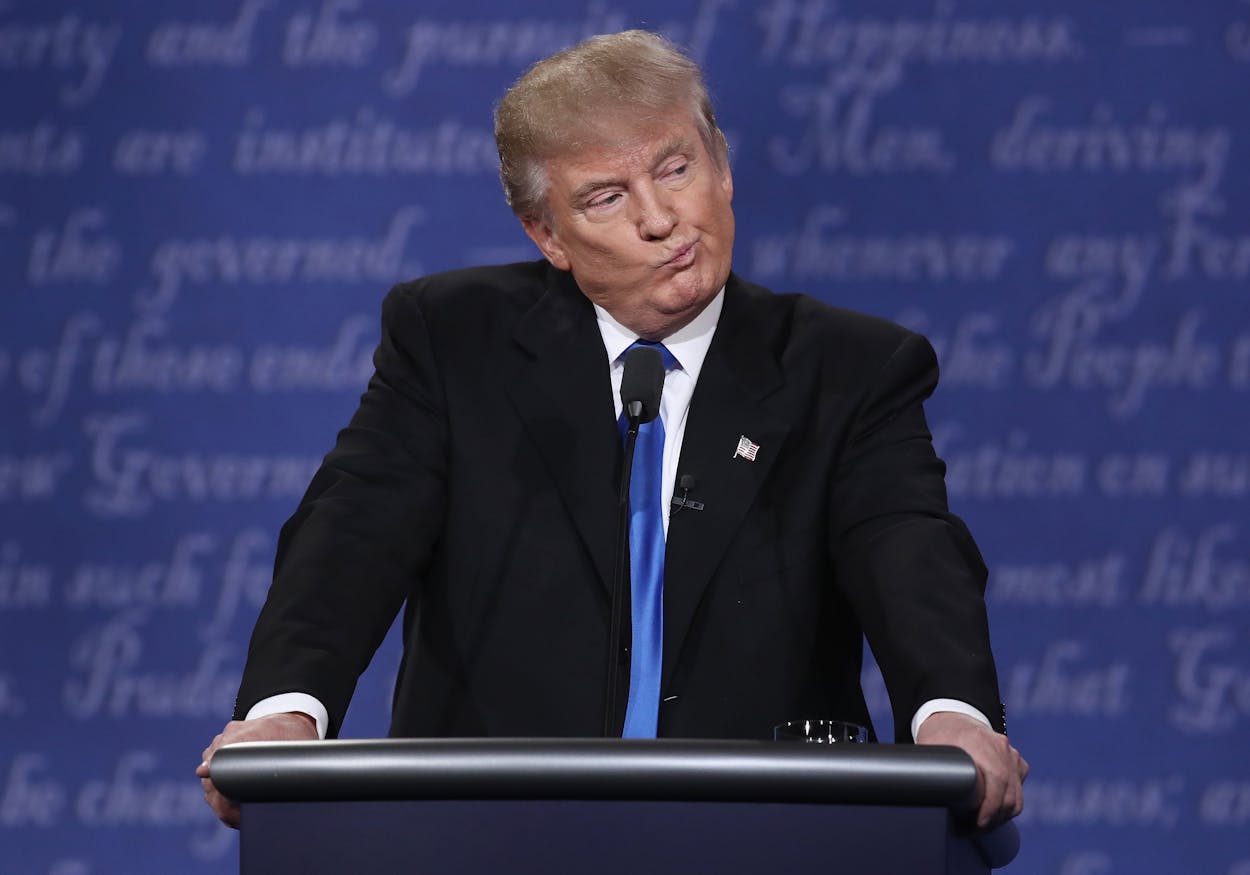Whenever possible, I like to watch presidential debates with partisans—or, during primaries, with people supporting a specific candidate—to observe their reactions in real time, before the conventional wisdom can harden. Last night, then, I joined Texas Democrats at Scholz Garten in downtown Austin, and found an interesting pattern among the people I spoke with after the debate concluded: though they all felt that Hillary Clinton had won, as one might expect the blue team to do, they remained nearly as anxious as they were prior to the debate. It’s a measure of how strange this entire election cycle has been, I suppose, that so many Americans, on both sides, feel uncertain about their own perceptions, and everyone else’s.
In any case, the conventional wisdom has now crystallized, and Democrats and anti-Trump conservatives can be relieved. It will take a few days for state and national polls to capture any shift in the race that may result from the debate, but polls taken last night show that a majority of Americans saw Clinton as the winner. Public Policy Polling highlights one finding of particular interest, given that Clinton has struggled to consolidate young Democrats behind her candidacy after an unexpectedly ferocious primary challenge from Bernie Sanders:
Perhaps most important for Clinton is that among young voters, who she has under performed with, 63% think she won the debate to only 24% for Trump. 47% of voters in that age group said the debate tonight made them more likely to vote for her, to only 10% who say it made them less likely to vote for her. For Trump with that group on the other hand, only 23% said the debate made them more likely to vote for him to 39% who said it made them less likely to.
Making matters worse, for Trump, is the general consensus that he performed relatively well during the first half hour or so of the debate, only to deteriorate badly by the end. I personally didn’t think he did particularly well during the first half hour, either, which was nominally focused on economic issues. That might be a reflection of my own biases in favor of NAFTA, which he vigorously assailed, but his repeated interruptions and interjections during Clinton’s responses struck me as yet another measure of the man’s lack of impulse control. In any case, we can all agree that he deteriorated badly by the end. David French, at the National Review, suggests an inflection point that strikes me as plausible:
But Hillary apparently did her homework, and if there’s one thing we learned during the primary, it’s that Trump hates it when debaters attack his wealth or his business. So she went there. She smacked his wealth and business success, and he just couldn’t help himself. For several agonizing minutes, he threw a wall of words at viewers while she just watched — with a satisfied, frozen smile. By the end of the debate he was all over the place — on the defensive on multiple fronts.
Arthur Lupia, a political scientist at the University of Michigan, highlighted the same stretch of the debate when Thomas Edsall, at the New York Times, asked for his review of the evening: questioning why Trump has refused to release his tax returns was “brilliant stagecraft,” Lupia wrote, because it “set the stage for days of questioning about the topic.” The same is true on other issues, too, as we saw this morning, when Trump called into Fox and Friends and doubled down on his attacks on Alicia Machado, a former Miss Universe. As Clinton observed last night, Trump had attacked Machado in personal and racist terms, referring to her as “Miss Piggy” and “Miss Housekeeping”; this morning, Trump argued that he was right to do so: “She gained a massive amount of weight.” Last night, at a moment when competence was crucial to his hopes of becoming president, Trump was unable to stop himself from unraveling in full view of the nation. And if this morning’s efforts are his idea of damage control—well, his surrogate, Rudy Giuliani, is right: it would probably be wise for him to skip the next two debates.







